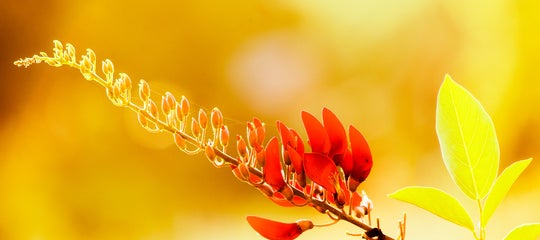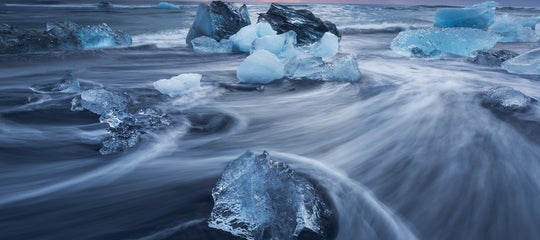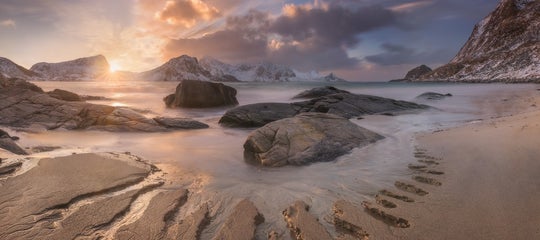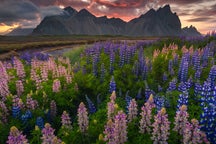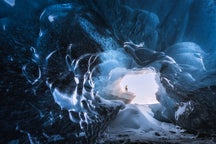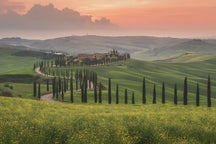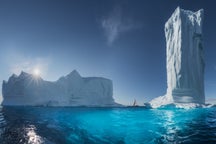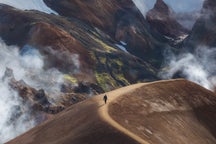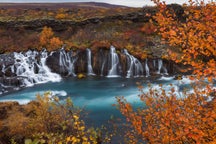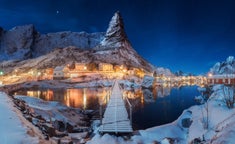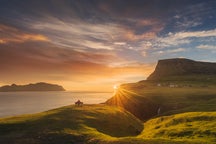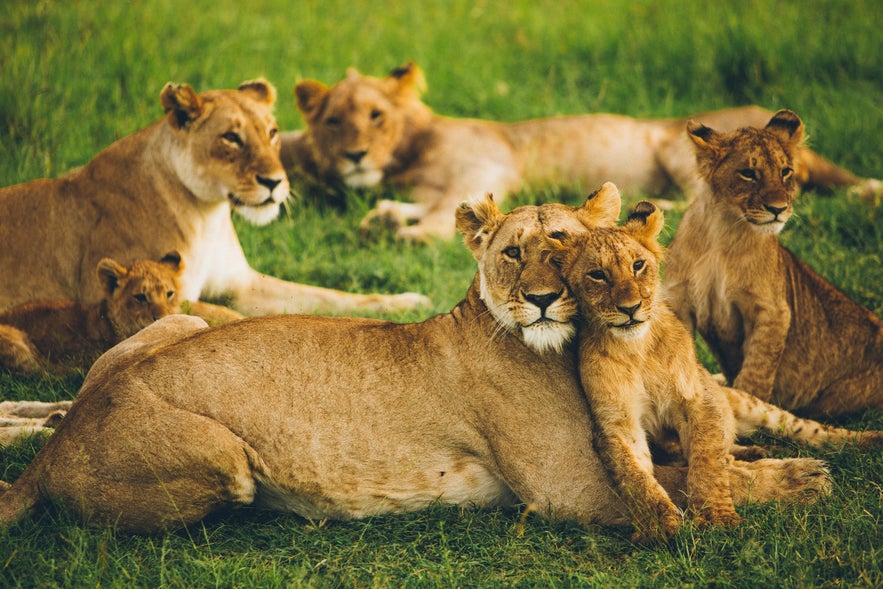
Finding your niche in photography can take some time. In the meanwhile, it’s a good idea to pick up your camera and experiment with different types of photography.
- Check out these 10 Wildlife Photography Tips for Beginners
- Find out How to Get Creative with a Fisheye Lens
- Discover this Ultimate Photography Guide to the Lavender Fields of Provence
There are so many genres out there that you’re bound to find something that will perk your interests and fit you to a tee. If you’ve just invested in a camera and you’re not really sure what to photograph, or even if you’re hoping to expand your repertoire of skills by putting some new photography techniques into practice, then look no further. We’ve compiled a list of the most popular types of photography which will challenge you to harness your creativity.
#15. Nature Photography
Nature photography is a large umbrella term that refers to many different genres of photography. Generally, it involves photographs taken outdoors that depict landscapes, plants, weather, underwater scenes, astrophotography and wildlife within the natural environment.
 Nature photography includes the sub-genre of astrophotography. Photo by: 'Unsplash'.
Nature photography includes the sub-genre of astrophotography. Photo by: 'Unsplash'.
The purpose of nature photography is not just to capture the beauty of our planet but to highlight its importance and how it continues to change. As such, nature photography plays an important role in conservation as well as science.
 Nature photography also includes underwater photography. Photo by: 'Unsplash'.
Nature photography also includes underwater photography. Photo by: 'Unsplash'.
Many nature photographers are self-employed and fund their own pursuits. However, it is possible to apply for and receive grants or funding from specific organisations to help raise awareness on particular topics. If you enjoy being outdoors with your camera, then nature photography might be for you.
#14. Fine Art Photography
Fine art photography is a genre that is focused on the artist’s vision, as opposed to capturing the reality of a scene. It can be applied to many different types of photography and is intended to allow for the expression of ideas, emotions or messages in a creative way.
 Fine art is the process of using photographic techniques to express creative vision. Photo by: 'Unsplash'.
Fine art is the process of using photographic techniques to express creative vision. Photo by: 'Unsplash'.
The fine art process involves using a variety of techniques to produce an image that makes an artistic statement. In comparison to a ‘normal’ photograph which relies only on basic exposure and minimal editing in the darkroom or on a computer, fine art images are like paintings in terms of how they are put together.
 Fine art photography generally involves a lot of editing. Photo by: 'Unsplash'.
Fine art photography generally involves a lot of editing. Photo by: 'Unsplash'.
There is no right or wrong way to produce a fine art photograph. The only restrictions you will face are your own creative boundaries and ideas. If you enjoy tinkering around with software and other mediums to produce powerful and thought-provoking images, then fine art is definitely a type of photography that you should explore.
#13. People Photography
This category doesn’t only refer to portraits. People photography covers a wide range of genres, including street photography, fashion, newborn, boudoir, travel, action and even editorial photography.
 Street photography is one form of photographing people. Photo by: 'Unsplash'.
Street photography is one form of photographing people. Photo by: 'Unsplash'.
Photographing people often involves capturing their personality as well as their behaviour and how they interact with their surroundings. As such, you need to have a good understanding of human nature, culture and how to engage your subject.
 Portraits can be made in natural light or in a studio. Photo by: 'Unsplash'.
Portraits can be made in natural light or in a studio. Photo by: 'Unsplash'.
You can choose to photograph people candidly or in a studio using a variety of different props, costumes, lighting effects and techniques. One of the advantages of this genre is that there will always be a market for photographs of people, meaning that if you can do it well, then it’s a good way to make money with your photography!
 One form of people photography is capturing a baby right when after it's born! Photo by: 'Unsplash'.
One form of people photography is capturing a baby right when after it's born! Photo by: 'Unsplash'.
#12. Event Photography
Photographing events is another great avenue for generating an income with photography. It is a fun and exciting genre that involves taking pictures of guests during occasions such as concerts, parties, festivals, restaurant openings, red carpet nights, weddings, sports as well as a number of other situations where a professional photographer may be required.
 Wedding photography is one of the biggest moneymaking genres.
Wedding photography is one of the biggest moneymaking genres.
One of the best things about event photography is that it doesn’t just focus on people. Instead, it entails capturing the ambience, energy and atmosphere of the surroundings. To do this, you will need to mingle well with the audience and take a mix of candid, posed and staged images in order to provide an overview of the entire affair or experience.
 Concerts are a great way to get out and about with your camera. Photo by: 'Unsplash'.
Concerts are a great way to get out and about with your camera. Photo by: 'Unsplash'.
Event photographers who are good at what they do and have a unique artistic or creative flair will usually be in high demand through word of mouth.
- See also: Ultimate Guide to Wedding Photography
#11. Architectural Photography
 City skylines are one example of architectural photography. Photo by: 'Unsplash'.
City skylines are one example of architectural photography. Photo by: 'Unsplash'.
Do you like wandering around your city and photographing the architecture? Then this genre might be the perfect fit for you.
 Photographing architecture involves a lot of emphasis on lines. Photo by: 'Unsplash'.
Photographing architecture involves a lot of emphasis on lines. Photo by: 'Unsplash'.
Architectural photography involves capturing cityscapes, the interior and exterior of buildings, monuments and other human-built structures. It also covers real estate photography, which is specifically focused on the sale of properties.
 Real estate photography and interiors come under the umbrella of architecture photography. Photo by: 'Unsplash'.
Real estate photography and interiors come under the umbrella of architecture photography. Photo by: 'Unsplash'.
Photographing architecture spans from being as easy as taking a simple photo of a building to using a variety of creative techniques to highlight certain details and points of interest. This includes experimenting with elements such as lines, repetition, colour, shadows and light. You can get as artistic with it as you want or even take a minimalistic stance to focus attention on certain aspects of a structure. The choice is yours!
 You can even create abstract images with architecture. Photo by: 'Unsplash'.
You can even create abstract images with architecture. Photo by: 'Unsplash'.
#10. Stock Photography
Do you have a huge library of professional images of random things that you don’t really have a purpose for? Better yet, do you enjoy working to a brief or on assignments?
 There has to be a use for this image of a woman throwing a pumpkin into the air. Photo by: 'Unsplash'.
There has to be a use for this image of a woman throwing a pumpkin into the air. Photo by: 'Unsplash'.
Stock photography is a genre that involves supplying images that may be licensed or used by others for their own creative pursuits. These images are usually uploaded to a large database that people can access. Stock images are frequently purchased for use on websites, blogs, apps, slideshows, magazines and newspapers.
 Stock images are generally used for blogs and websites. Photo by: 'Unsplash'.
Stock images are generally used for blogs and websites. Photo by: 'Unsplash'.
The demand from customers for certain types of photographs means that oftentimes, stock photography agencies generally have a list of what they need to be covered. This can span across all sorts of genres, from nature through to portraits of people and pets.
 There is demand for all sorts of stock images. Photo by: 'Unsplash'.
There is demand for all sorts of stock images. Photo by: 'Unsplash'.
Although stock photography generally sells for a small amount, if you have the time to dedicate to taking photographs that people want, then you can make a mint!
#9. Macro Photography
Macro photography is a genre that involves taking extreme close-ups of all sorts of things, from plants to insects and things that the human eye is generally unable to see. It opens up an incredible window to a whole realm that we would otherwise be unaware of.
 Macro images go beyond insects... they can also involve small animals! Photo by: 'Unsplash'.
Macro images go beyond insects... they can also involve small animals! Photo by: 'Unsplash'.
Taking macro pictures can take years to master though the rewards can be very satisfying. Techniques that are used in macro photography include using a wide aperture, focus stacking, image blending, flash photography and tilting the plane of focus.
 Getting microscopic. Photo by: 'Unsplash'.
Getting microscopic. Photo by: 'Unsplash'.
To get started with macro photography, all you need is a macro lens. Some smartphones even come with macro lenses these days, so some of you will already have the technology right at your fingertips.
 A macro image of a frozen bubble. Photo by: 'Unsplash'.
A macro image of a frozen bubble. Photo by: 'Unsplash'.
If you’re wondering what to photograph, simply head outside into your garden and take a look at the flowers or bugs and other things that might be lurking around! You can also take great macro images of water droplets, fruits and vegetables, household items and even your food.
- See also: Ultimate Guide to Focus Stacking
#8. Pet Photography
 If you have pets then chances are that you'll have taken at least one photo of them already, right? Photo by: 'Unsplash'.
If you have pets then chances are that you'll have taken at least one photo of them already, right? Photo by: 'Unsplash'.
Who doesn’t like taking pictures of their pets? If you have a love for animals that you’re willing to combine with your photography skills, then shooting pets can be a dream job or just a great way to channel your creativity!
 Pet portraits are getting more popular these days. Photo by: 'Unsplash'.
Pet portraits are getting more popular these days. Photo by: 'Unsplash'.
Pet photography can range from simple portraits in the backyard all the way through to staged sets and even series of images that tell a story. It can be more difficult to get your pet than children to sit still, so to be a successful pet photographer, you’ll need to have a lot of patience, training and knowledge. It’s not anything like photographing people, where you can direct them to do certain things again if you happen to miss a shot!
 Develop your own style to make your pet photography more unique. Photo by: 'Unsplash'.
Develop your own style to make your pet photography more unique. Photo by: 'Unsplash'.
Most photographers start out by photographing their own pets at play. You can also ask your friends and extended family if you can take pictures of their pets in order to build up a portfolio. The key to being a successful pet photographer is to develop your own unique and fun style!
- See also: The Best Lenses for Wildlife Photography
#7. Commercial Photography
 These chairs and table could be used to sell furniture in a catalogue. Photo by: 'Unsplash'.
These chairs and table could be used to sell furniture in a catalogue. Photo by: 'Unsplash'.
Commercial photography refers to images which are taken specifically for the purpose of making sales, for advertising or marketing. These activities can pertain to a certain person, business, brand, service or product.
 Food photography is a sub-genre of commercial photography. Photo by: 'Unsplash'.
Food photography is a sub-genre of commercial photography. Photo by: 'Unsplash'.
While commercial photographs can include still life, food, portraits, pets, landscapes, people and all sorts of other subjects, the underlying root that ties them all together is that they are used in a way that represents whatever it is that they are supposed to be selling.
 Product photography is a great way to earn an income as a photographer. Photo by: 'Unsplash'.
Product photography is a great way to earn an income as a photographer. Photo by: 'Unsplash'.
Some examples of commercial photography are landscapes which have been taken for tourism boards, pictures of pizza taken for an Italian restaurant or the interior of a new bookshop to promote its opening.
- See also: Travel Photography Explained
#6. Abstract Photography
 An abstract of a forest. Photo by: 'Unsplash'.
An abstract of a forest. Photo by: 'Unsplash'.
Do you like to get a little experimental with your camera gear and other equipment? Abstract photography is the art of presenting the subject in such a way that the viewer is unable to make an immediate connection between it and the real world.
 It might take you a while to figure out what this could be. Photo by: 'Unsplash'.
It might take you a while to figure out what this could be. Photo by: 'Unsplash'.
When creating abstract images, photographers usually tend to concentrate on textures, details, colours and patterns while making use of strong compositional and photographic techniques to present thought-provoking scenes.
 Abstract images make use of patterns, textures and repetition. Photo by: 'Unsplash'.
Abstract images make use of patterns, textures and repetition. Photo by: 'Unsplash'.
Anyone with a camera can take abstract pictures. It’s a great way to express your creativity and again, it’s a type of photography that can span across genres. You can make abstract images of anything from landscapes to city lights. The possibilities are endless!
- See also: 25 Tips for Creative Beach Photography
#5. Conceptual Photography
 Storytelling without words. Photo by: 'Unsplash'.
Storytelling without words. Photo by: 'Unsplash'.
Conceptual photography is a genre that is focused on storytelling without words. This type of photography exists for artists to express their ideas in creative ways, taking both themselves and their audience out of their comfort zones into another world.
 Conceptual photographs can be used to convey messages. Photo by: 'Unsplash'.
Conceptual photographs can be used to convey messages. Photo by: 'Unsplash'.
Conceptual photographs are often used to convey social and political messages or to evoke a strong emotional response. They can be surreal and minimalistic or even chaotic in nature, employing a vast array of different techniques from execution through to post-production. The end result is always to explore and fulfil the artist’s own creative vision.
 Conceptual photographs are used to express an artist's own vision. Photo by: 'Unsplash'.
Conceptual photographs are used to express an artist's own vision. Photo by: 'Unsplash'.
- See also: Interview with Claire Droppert
#4. Documentary Photography
 Documenting a specific era in time. Photo by: 'Unsplash'.
Documenting a specific era in time. Photo by: 'Unsplash'.
Documentary photography relates to images that are part of a long-term project with a complex storyline. Traditionally, documentary photographs have been used to trace the history of certain events, such as wars and civil unrest. However, these days, documentary photography can also be used for artistic pursuits.
 Documentary photography tells a story. Photo by: 'Unsplash'.
Documentary photography tells a story. Photo by: 'Unsplash'.
Photographers who work in this genre generally tell a story in a way that fits with certain ideas, beliefs or a brief that they are given, documenting a series of images that fulfils the intent of the storyline. Some documentary photographers actively help to move the narrative in a direction that will be beneficial to the overall storyline.
 You can use documentary photography to fulfil the intent of a certain storyline. Photo by: 'Unsplash'.
You can use documentary photography to fulfil the intent of a certain storyline. Photo by: 'Unsplash'.
#3. Photojournalism
 Photojournalism relates to breaking news stories and events. Photo by: 'Unsplash'.
Photojournalism relates to breaking news stories and events. Photo by: 'Unsplash'.
In comparison to documentary photography, photojournalism relates to images that are used to illustrate breaking news stories or events in the present. Again, this can pertain to wars as well as other sociological, political or environmental topics.
 Photojournalism is objective compared to documentary photography. Photo by: 'Unsplash'.
Photojournalism is objective compared to documentary photography. Photo by: 'Unsplash'.
The main difference is that photojournalists capture images in a manner called ‘reportage’. This means that they document the scenes from different aspects in an objective manner, before submitting the images to someone else to edit – usually at the agency for which they work.
#2. Lifestyle Photography
 Lifestyle photography is all about people in their natural environment. Photo by: 'Unsplash'.
Lifestyle photography is all about people in their natural environment. Photo by: 'Unsplash'.
Lifestyle photography is a type of photography that involves telling the stories of people within their everyday environment in an artistic way. It is similar to documentary photography and involves a mixture of candid and staged shots, which reflect natural moments or scenarios that are likely to happen the way that they are portrayed.
 Even staged moments reflect things that are likely to happen in real life. Photo by: 'Unsplash'.
Even staged moments reflect things that are likely to happen in real life. Photo by: 'Unsplash'.
To be successful in this genre, you need to find a good balance between directing your subjects and making them feel comfortable. This way, they’ll be able to relax and do things as they normally would while you put your energy into capturing them in their element!
 Lifestyle photography works best when your subjects feel comfortable. Photo by: 'Unsplash'.
Lifestyle photography works best when your subjects feel comfortable. Photo by: 'Unsplash'.
#1. Aerial and Drone Photography
If you love adrenaline-inducing pursuits, then aerial photography is a great way to channel your creativity! You can capture landscapes, cities and other incredible scenes from above as your soar through the sky in a helicopter, plane or other type of aircraft.
 Aerial photography allows us to view the world in new and exciting ways. Photo by: 'Unsplash'.
Aerial photography allows us to view the world in new and exciting ways. Photo by: 'Unsplash'.
Taking aerial photographs can be challenging and expensive, though the results are ultimately rewarding. Don’t worry if you have a fear of heights – you can still get a bird’s eye view of the world by using a drone or mounting your camera to a flying object!
 Aerial photography has been made easier with the introduction of drones. Photo by: 'Unsplash'.
Aerial photography has been made easier with the introduction of drones. Photo by: 'Unsplash'.
So there you have it, 15 fascinating types of photography that will no doubt have you excited to get out and about to shoot. Do you have a particular genre that you find interesting? What is it about it that you enjoy? Leave a comment for us below!
About the author: Serena Dzenis is a landscape photographer based in Iceland. You can find more of her work on her website or by following her on Facebook and Instagram.
Hone your nature photography skills in-field and on-location with some of the best photography educators in the industry. Join us on an international photography tour or workshop!


